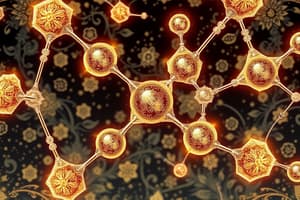Podcast
Questions and Answers
What percentage of the total grade is allocated to the final exam?
What percentage of the total grade is allocated to the final exam?
- 40% (correct)
- 20%
- 10%
- 30%
To pass the course, what is the minimum percentage a student must score on the final exam?
To pass the course, what is the minimum percentage a student must score on the final exam?
- 40%
- 20%
- 10%
- 30% (correct)
Which of the following is NOT part of the course content outlined?
Which of the following is NOT part of the course content outlined?
- Polymers
- Alcohols, ethers, aldehydes and ketones
- Biochemical pathways (correct)
- Carboxylic acids
Which edition of Organic Chemistry is recommended as a primary learning resource?
Which edition of Organic Chemistry is recommended as a primary learning resource?
What is the grade point associated with a percentage score of 76% to less than 80%?
What is the grade point associated with a percentage score of 76% to less than 80%?
What was the original focus of organic chemistry?
What was the original focus of organic chemistry?
What process is used to separate components in crude oil based on boiling points?
What process is used to separate components in crude oil based on boiling points?
Which of the following properties is NOT associated with organic compounds?
Which of the following properties is NOT associated with organic compounds?
Why is carbon a crucial element in organic chemistry?
Why is carbon a crucial element in organic chemistry?
What is an atom composed of?
What is an atom composed of?
Flashcards
Organic Chemistry
Organic Chemistry
The study of compounds containing carbon. These compounds are found everywhere in nature, from food and medicine to our own bodies.
Crude Oil
Crude Oil
A mixture of hydrocarbons extracted from the ground. It's not very useful in its raw form because of its variable composition, but it can be broken down into simpler, more useful mixtures.
Fractional Distillation
Fractional Distillation
A process used to separate a mixture based on different boiling points. Each component of the mixture is collected as it reaches its boiling point.
Why Carbon in Organic Chemistry?
Why Carbon in Organic Chemistry?
Signup and view all the flashcards
Atom
Atom
Signup and view all the flashcards
What is Organic Chemistry?
What is Organic Chemistry?
Signup and view all the flashcards
Origin of the term "organic"
Origin of the term "organic"
Signup and view all the flashcards
Importance of Organic Chemistry
Importance of Organic Chemistry
Signup and view all the flashcards
Key concepts in Organic Chemistry
Key concepts in Organic Chemistry
Signup and view all the flashcards
Scope of Organic Chemistry
Scope of Organic Chemistry
Signup and view all the flashcards
Study Notes
Course Information
- Course Name: Organic Chemistry
- Course Code: CHE111
- Instructor: Assoc. Prof. Ahmed Ragab
- Lecture Topic: Bonding and Molecular Structure
Course Grading
-
Attendance: 20%
-
Course Activities (Quizzes, Assignments, Presentations): 30%
-
Lab: 10%
-
Midterm Exam: 40%
-
Final Exam: 100%
-
Passing grade: 60% overall
-
Final Exam requirement: 30% of the final exam mark (minimum of 12 out of 40)
Grading System
- A+ (More than 97%): 4 points
- A (93% to less than 97%): 4 points
- A- (89% to less than 93%): 3.7 points
- B+ (84% to 89%): 3.3 points
- B (80% to 84%): 3.0 points
- B- (76% to less than 80%): 2.7 points
- C+ (73% to less than 76%): 2.3 points
- C (70% to 73%): 2.0 points
- C- (67% to less than 70%): 1.7 points
- D+ (64% to less than 67%): 1.3 points
- D (60% to less than 64%): 1.0 point
- F (Less than 60%): 0.0 points
Course Content
- Introduction
- Formula weights, Avogadro's number, empirical formulas from analyses
- Bonding and molecular structure
- Acids and bases
- Alkanes
- Alkenes
- Alkynes
- Alcohols, ethers, aldehydes, and ketones
- Carboxylic acids
- Aromatic compounds
- Polymers
Learning Resources
- Organic Chemistry, 11th Edition, by Francis Carey, Robert Giuliano, Neil Allison, and Susan Bane.
- Introduction to Organic Chemistry, Fourth Edition by William Brown and Thomas Poon.
- Organic Chemistry, 9th Edition by T. W. Graham Solomons and Craig B. Fryhle.
What is Organic Chemistry?
- The study of carbon-containing compounds.
- Traditionally, the study of compounds derived from living organisms.
- Now considers all carbon-containing compounds.
- The "Vital Force" theory was disproven in 1828 by Friedrich Wöhler.
Organic Chemistry Overview
- Oil (petroleum) is a mixture of hydrocarbons.
- Hydrocarbons predominantly contain hydrogen and carbon.
- Crude oil is broken down into simpler mixtures via fractional distillation.
Properties of Organic Compounds
- Covalently bonded
- Low melting points
- Non-electrolytes (do not conduct electricity)
- Nonpolar
- React slower than inorganic compounds
- Require high activation energies
- Generally insoluble in water
Why Carbon?
- Carbon readily forms strong covalent bonds with other carbon atoms, as well as hydrogen, nitrogen, and oxygen.
- Carbon forms chains and rings
Principles of Atomic Structure
- Atoms/Compounds: Pure substances are either elements or compounds
- ATOM: The smallest unit of ordinary matter
- Electron structure of atom: Atoms are composed of a dense nucleus containing protons and neutrons, surrounded by orbiting electrons.
- Isotopes: Atoms of the same element having different numbers of neutrons.
- Volume of atom: Most of the volume of an atom is occupied by the electron "cloud".
- Atomic orbitals: Mathematical functions that describe locations where electrons are likely to be found in an atom.
- These locations are usually represented as orbitals.
- Valence electrons: Outermost electrons involved in chemical bonding
- Periodic Table
- Electrons fill orbitals in specific patterns that correlates with the structure of the periodic table
Formula Weights, Avogadro's Number, and the Mole
- Formula weight (FW): Sum of the atomic weights of atoms in the formula.
- Avogadro's Number: The number of atoms or molecules in one mole (6.022 x 1023)
- Mole: The amount of a substance containing Avogadro's number of atoms, molecules, or other particles.
- Molar Mass: The mass in grams of one mole of a substance (numerically equal to its formula weight in amu).
Empirical and Molecular Formulas
- Empirical Formula: Gives the simplest whole-number ratio of atoms in a compound.
- Molecular Formula: Shows the actual number of atoms of each element in a molecule; it's a multiple of the empirical formula.
- Method for getting the molecular formula from the empirical formula.
Empirical Formula from Combustion Analysis
- Method for determining the empirical formula of an unknown compound by analyzing product's mass from combustion reaction
- Determine the mass percentages of each element present
- Use these percentages to determine the empirical formula.
Quiz Questions (Examples)
- Questions involving calculating molar mass, empirical/molecular formulas, and analyzing combustion reactions.
Studying That Suits You
Use AI to generate personalized quizzes and flashcards to suit your learning preferences.




